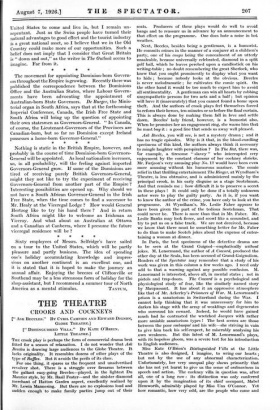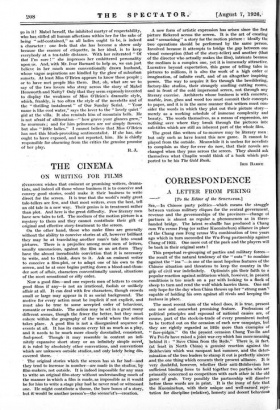THE THEATRE
CROOKS AND COCKNEYS
r ASK BECCIZS." BY CYRIL CAMPION AND EDWARD DIGNON, GLOBE THEATRE.] DISTINGUISHED VILLA." By KATE O'BRIEN. Liz-rim THEATRE.] THE crook play is perhaps the form of commercial drama best fitted for a season of relaxation. I do not wonder that Ask Beccles is drawing large audiences to the Globe Theatre. It lacks originality. It resembles dozens of other plays of the type of Raffles. But it avoids the perils of its class.
For one thing, it spares us the frequent and unadvertised revolver shot. There is a struggle over firearms between the gallant easy-going Beccles—played, in the lightest Du Maurier style, by Mr. Basil Foster—and the sinister diamond merchant of Hatton Garden aspect, excellently realized by Mr. Lewin Mannering. But there are no explosions loud and sudden enough to make family parties jump out of their
seats. Producers of these plays would do well to avoid, bangs and to reassure us in advance by an announcement to that effect on the programme. One does hate a noise in hot weather.
Next, Beccles, besides being a gentleman, is • a humorist. He commits crimes in the manner of a conjurer at a children's party, one of his coups being the concealment of an utterly unsaleable, because universally celebrated, diamond in a split golf ball, which he leaves perched upon a candlestick on his writing-table ; no doubt remembering the great Sherlock, who knew that you ought prominently to display what you want to hide ; because nobody looks at the obvious. Beccles is never melodramatic ; he cultivates the comic spirit. On the other hand it would be too much to expect him to avoid all sentimentality. A gentleman can win all hearts by robbing Unsympathetic persons for two acts and a half ; but opinion will have it (inaccurately) that you cannot found a home upon theft. And the authors of crook plays feel themselves forced to reform their heroes, ten minutes or so before the final curtain. This is always done by making them fall in love and settle down. Beccles' lady friend, however, is a humorist also. When he promises her an engagement ring, she warns him that he must buy it : a good line that sends us away well pleased.
Ask Beccles, you will see, is not a mystery drama ; and it has no tragic episodes. Why is it that, in the blood-curdling specimens of this kind, the authors always think it necessary to mingle laughter with perspiration ? In The Bat, there was, for example, a tiresome slavey " who interrupted eery enjoyment by the constant clamour of her cockney shrieks. Mr. Farjeon's very amusing play No. 17 would have been even more amusing without his humorous mariner. The comic relief in that thrilling entertainment The Ringer, at Wyndham's Theatre, is less obtrusive, and is administered mainly by the principal crook, in his early disguise as a stage Scotchman. And that reminds me : how difficult it is to preserve a secret in these plays I It could only be done if a totally unknown actor were to play the guilty party. As it is, if you want to know the author of the crime, you have only to look at the programme. At Wyndham's, Mr. Leslie Faber appears to have been given the part of the tedious Scotchman. That could never be. There is more than that in Mr. Faber. Mr. Leslie Banks may look fierce, and scowl like a scoundrel, and try to put us on a false track. We are not deceived, because we know that there must be something better for Mr. Faber to do than to make Scotch jokes about the expense of enter- taining a woman at dinner.
In Paris, the best specimens of the detective drama are to be seen at the Grand Guignol—emphatically without jokes. M. Lenormand, the author of A Coward, produced the other day at the Scala, has been accused of Grand-Guignolism. Readers of the Spectator may remember that a study of his work was given in this column a few weeks ago. I need only add to that a warning against any possible confusion. M. Lenormand is interested, above all, in mental states ; not in pistols and trap-doors. The Coward is a psychological and physiological study of fear, like the similarly named story by Maupassant.. It has about it an oppressive atmosphere like that of Mr. Ackerley's Prisoners of War. M. Lenormand's prison is a sanatorium in Switzerland during the War. I cannot help thinking that it was unnecessary for him to darken his stage with the array of weaklings and degenerates who surround his coward. Indeed, he would have gained much had he contrasted the wretched Jacques with rather more amiable sanatorium types ! The best scenes are those between the poor embusqud and his wife—she striving in vain to give him back his self-respect, he miserably analysing his own weakness. But this latest of M. Lenormand's plays, with its hopeless gloom, was a severe test for his introduction to English audiences.
Miss Kate O'Brien's Distinguished Villa at the Little Theatre is also designed, I imagine, to wring our hearts ; but not by the use of any abnormal characterization. Unfortunately, her very unequal play shows primarily that she has not yet learnt to give us the sense of ordinariness in speech and action. The cockney villa in question was, after all, one of a long row : its distinction was only conferred upon it by the imagination of its chief occupant, Mabel Hemworth, admirably played by Miss Una O'Connor. Yet how romantic, how very odd, are the people who come and
go in it ! Mabel herself, the inhibited martyr of respectability, who has stifled all human affections within her for the sake of being "self-contained," as all ladies ought to be, is indeed a character : one feels that she, has become a shrew only because the essence of etiquette, in her ideal, is to keep everybody at a tea-table distance. With her reiterated " Of that I'm sure I " she impresses her embittered personality upon us. And, with Mr. Ivor Barnard to help us, we can just believe in her much more conventionally drawn husband, whose vague aspirations are kindled by the glow of 'suburban sunsets. At least Miss O'Brien appears to know these people ; or to have met people like them. But, oh, what are we to. say of the two lovers who stray across the story of Mabel Hemworth and Natty? Only that they seem expressly invented to display the weakness of Misi O'Brien's dramatic style, which, frankly, is too often the style of the novelette and of the " thrilling instalment " of Our Sunday Serial. " ‘r.our. name is like cool water," says the lover to the " lovely quiet '' girl at the villa: It also reminds him of mountain' bells. He is not afraid of alliteration" how grave your glances grew," he Murmurs ; and for him primroses are not simply flowers,' but also " little ladies." I cannot believe that Miss O'Brien has met this blush-provoking sentimentalist. If she has, she ought to have exposed, and not reported; him. He is chiefly responsible for obscuring from the critics the genuine promise of her play. R. J.







































 Previous page
Previous page